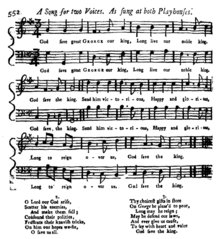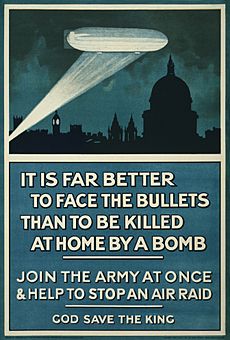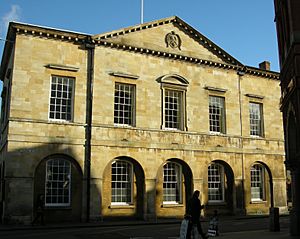God Save the King facts for kids

Publication of an early version in The Gentleman's Magazine, October 1745. The title, on the contents page, is given as "God save our lord the king: A new song set for two voices".
|
|
| National or royal anthem of |
|
|---|---|
| Also known as | "God Save the Queen" (when the monarch is female) |
| Music | Unknown |
| Adopted | September 1745 |
"God Save the King", alternatively "God Save the Queen" (dependent on the title of the reigning monarch), is the national or royal anthem in most Commonwealth realms, their territories, and the British Crown Dependencies. The author of the tune is unknown and it may originate in plainchant, but an attribution to the composer John Bull is sometimes made.
"God Save the King" is the de facto national anthem of the United Kingdom and one of two national anthems used by New Zealand since 1977, as well as for several of the UK's territories that have their own additional local anthem. It is also the royal anthem—played specifically in the presence of the monarch—of the aforementioned countries, in addition to Australia (since 1984), Canada (since 1980), Belize (since 1981), Antigua and Barbuda (since 1981), The Bahamas (since 1973), and most other Commonwealth realms.
In countries not part of the British Empire, the tune of "God Save the King" has provided the basis for various patriotic songs, though still generally connected with royal ceremony. The melody continues to be used for the national anthem of Liechtenstein, "Oben am jungen Rhein", and the royal anthem of Norway, "Kongesangen". The melody is used for the American patriotic song "My Country, 'Tis of Thee" (also known as "America"). The melody was also used for the national anthem "Heil dir im Siegerkranz" of the German Empire from 1871 to 1918 and as "The Prayer of Russians", the imperial anthem of Russia from 1816 to 1833. In Switzerland, it is known as "Rufst du, mein Vaterland".
Beyond its first verse, which is consistent, "God Save the King/Queen" has many historic and extant versions. Since its first publication, different verses have been added and taken away and, even today, different publications include various selections of verses in various orders. In general, only one verse is sung. Sometimes two verses are sung and, on rare occasions, three.
The sovereign and her or his spouse are saluted with the entire composition, while other members of the royal family who are entitled to royal salute (such as the Prince of Wales and the Duke of Cambridge, along with their spouses) receive just the first six bars. The first six bars also form all or part of the viceregal salute in some Commonwealth realms other than the UK (e.g., in Canada, governors general and lieutenant governors at official events are saluted with the first six bars of "God Save the King" followed by the first four and last four bars of "O Canada"), as well as the salute given to governors of British overseas territories.
Contents
History
In The Oxford Companion to Music, Percy Scholes points out the similarities to an early plainsong melody, although the rhythm is very distinctly that of a galliard, and he gives examples of several such dance tunes that bear a striking resemblance to "God Save the King/Queen". Scholes quotes a keyboard piece by John Bull (1619) which has some similarities to the modern tune, depending on the placing of accidentals which at that time were unwritten in certain cases and left to the discretion of the player (see musica ficta). He also points to several pieces by Henry Purcell, one of which includes the opening notes of the modern tune, setting the words "God Save the King". Nineteenth-century scholars and commentators mention the widespread belief that an old Scots carol, "Remember O Thou Man", was the source of the tune.
The first published version of what is almost the present tune appeared in 1744 in Thesaurus Musicus. The 1744 version of the song was popularised in Scotland and England the following year, with the landing of Charles Edward Stuart and was published in The Gentleman's Magazine (see illustration above). This manuscript has the tune depart from that which is used today at several points, one as early as the first bar, but is otherwise clearly a strong relative of the contemporary anthem. It was recorded as being sung in London theatres in 1745, with, for example, Thomas Arne writing a setting of the tune for the Drury Lane Theatre.
Scholes' analysis includes mention of "untenable" and "doubtful" claims, as well as "an American misattribution". Some of these are:
- James Oswald was a possible author of the Thesaurus Musicus, so may have played a part in the history of the song, but is not a strong enough candidate to be cited as the composer of the tune.
- Henry Carey: Scholes refutes this attribution: first on the grounds that Carey himself never made such a claim; second, when the claim was made by Carey's son (in 1795), it was in support of a request for a pension from the British Government; and third, the younger Carey claimed that his father, who died in 1743, had written parts of the song in 1745. It has also been claimed that the work was first publicly performed by Carey during a dinner in 1740 in honour of Admiral Edward "Grog" Vernon, who had captured the Spanish harbour of Porto Bello (then in the Viceroyalty of New Granada, now in Panama) during the War of Jenkins' Ear.
Scholes recommends the attribution "traditional" or "traditional; earliest known version by John Bull (1562–1628)". The English Hymnal (musical editor Ralph Vaughan Williams) gives no attribution, stating merely "17th or 18th cent."
Original lyrics
The lyrics as published in the Gentleman's Magazine in 1745 ran:
God save great George our king,
Long live our noble king,
God save the king.
Send him victorious,
Happy and glorious,
Long to reign over us,
God save the king!
Use in the United Kingdom
Like many aspects of British constitutional life, "God Save the King" derives its official status from custom and use, not from Royal Proclamation or Act of Parliament. The variation in the UK of the lyrics to "God Save the King" is the oldest amongst those currently used, and forms the basis on which all other versions used throughout the Commonwealth are formed; though, again, the words have varied over time.
England has no official national anthem of its own; "God Save the King" is treated as the English national anthem when England is represented at sporting events (though there are some exceptions to this rule, such as cricket where "Jerusalem" is used). There is a movement to establish an English national anthem, with Blake and Parry's "Jerusalem" and Elgar's "Land of Hope and Glory" among the top contenders. Wales has a single official national anthem, "Hen Wlad Fy Nhadau" (Land of my Fathers) while Scotland uses unofficial anthems ("Scotland the Brave" was traditionally used until the 1990s, since then, "Flower of Scotland" is more commonly used), these anthems are used formally at state and national ceremonies as well as international sporting events such as football and rugby union matches. On all occasions in Northern Ireland, "God Save the King" is still used as the official anthem.
In 2001, it was claimed that the phrase "No surrender" was occasionally sung in the bridge before "Send her victorious" by England football fans at matches.
Since 2003, "God Save the King/Queen", considered an all-inclusive anthem for Great Britain and Northern Ireland, as well as other countries within the Commonwealth, has been dropped from the Commonwealth Games. Northern Irish athletes receive their gold medals to the tune of the "Londonderry Air", popularly known as "Danny Boy". In 2006, English winners heard Elgar's "Pomp and Circumstance March No. 1", usually known as "Land of Hope and Glory", but after a poll conducted by the Commonwealth Games Council for England prior to the 2010 Games, "Jerusalem" was adopted as England's new Commonwealth Games anthem. In sports in which the UK competes as one nation, most notably as Great Britain at the Olympics, the anthem is used to represent anyone or any team that comes from the United Kingdom.
Lyrics in the UK
The phrase "God Save the King" is much older than the song, appearing, for instance, several times in the King James Bible. A text based on the 1st Book of Kings Chapter 1: verses 38–40, "And all the people rejoic'd, and said: God save the King! Long live the King! May the King live for ever, Amen", has been sung at every coronation since that of King Edgar in 973. Scholes says that as early as 1545 "God Save the King" was a watchword of the Royal Navy, with the response being "Long to reign over us". He also notes that the prayer read in churches on anniversaries of the Gunpowder Plot includes words which might have formed part of the basis for the second verse "Scatter our enemies...assuage their malice and confound their devices".
In 1745, The Gentleman's Magazine published "God save our lord the king: A new song set for two voices", describing it "As sung at both Playhouses" (the Theatres Royal at Drury Lane and Covent Garden). Traditionally, the first performance was thought to have been in 1745, when it was sung in support of King George II, after his defeat at the Battle of Prestonpans by the army of Charles Edward Stuart, son of James Francis Edward Stuart, the Jacobite claimant to the British throne.
It is sometimes claimed that, ironically, the song was originally sung in support of the Jacobite cause: the word "send" in the line "Send him victorious" could imply that the king was absent. However, the Oxford English Dictionary cites examples of "[God] send (a person) safe, victorious, etc." meaning "God grant that he may be safe, etc.". There are also examples of early 18th-century drinking glasses which are inscribed with a version of the words and were apparently intended for drinking the health of King James II and VII.
Scholes acknowledges these possibilities but argues that the same words were probably being used by both Jacobite and Hanoverian supporters and directed at their respective kings.
In 1902, the musician William Hayman Cummings, quoting mid-18th century correspondence between Charles Burney and Sir Joseph Banks, suggested that the words had been based on a Latin verse composed for King James II at the Chapel Royal.
O Deus optime
Salvum nunc facito
Regem nostrum
Sic laeta victoria
Comes et gloria
Salvum iam facito
Tu dominum.
Standard version in the United Kingdom
God save our gracious King!
Long live our noble King!
God save the King!
Send him victorious,
Happy and glorious,
Long to reign over us:
God save the King!
O Lord our God arise,
Scatter his enemies,
And make them fall:
Confound their politics,
Frustrate their knavish tricks,
On Thee our hopes we fix:
God save us all.
Thy choicest gifts in store,
On him be pleased to pour;
Long may he reign:
May he defend our laws,
And ever give us cause,
With heart and voice to sing,
God save the King!
The middle verse has been commonly omitted since the late 19th century. When the monarch of the time is female, "King" is replaced with "Queen" and all masculine pronouns are replaced with their feminine equivalents.
There is no definitive version of the lyrics. However, the version consisting of the three above verses has the best claim to be regarded as the "standard" British version, appearing not only in the 1745 Gentleman's Magazine, but also in publications such as The Book of English Songs: From the Sixteenth to the Nineteenth Century (1851), National Hymns: How They Are Written and How They Are Not Written (1861), Household Book of Poetry (1882), and Hymns Ancient and Modern, Revised Version (1982).
The same version with verse two omitted appears in publications including Scouting for Boys (1908), and on the British Monarchy website.
According to Alan Michie's Rule, Britannia, which was published in 1952, after the death of King George VI but before the coronation of Queen Elizabeth II, when the first General Assembly of the United Nations was held in London in January 1946 the King, in honour of the occasion, "ordered the belligerent imperious second stanza of 'God Save the King' to be rewritten to bring it more into the spirit of the brotherhood of nations."
In the UK, the first verse is typically sung alone, even on official occasions, although the third verse is sometimes sung in addition on certain occasions such as during the opening ceremonies of the 2012 Summer Olympics and 2012 Summer Paralympics, and usually at the Last Night of the Proms.
Standard version of the music
The standard version of the melody and its key of G major are still those of the originally published version, although the start of the anthem is often signalled by an introductory timpani roll of two bars length. The bass line of the standard version differs little from the second voice part shown in the original, and there is a standard version in four-part harmony for choirs. The first three lines (six bars of music) are soft, ending with a short crescendo into "Send him victorious", and then is another crescendo at "over us:" into the final words "God save the King".
In the early part of the 20th century there existed a Military Band version in the higher key of B♭, because it was easier for brass instruments to play in that key, though it had the disadvantage of being more difficult to sing: however now most Bands play it in the correct key of concert F.
Since 1953, the anthem is sometimes preceded by a fanfare composed by Gordon Jacob for the coronation of Queen Elizabeth II.
Performance in the UK
The style most commonly heard in official performances was proposed as the "proper interpretation" by King George V, who considered himself something of an expert (in view of the number of times he had heard it). An Army Order was duly issued in 1933, which laid down regulations for tempo, dynamics and orchestration. This included instructions such as that the opening "six bars will be played quietly by the reed band with horns and basses in a single phrase. Cornets and side-drum are to be added at the little scale-passage leading into the second half of the tune, and the full brass enters for the last eight bars". The official tempo for the opening section is a metronome setting of 60, with the second part played in a broader manner, at a metronome setting of 52. In recent years the prescribed sombre-paced introduction is often played at a faster and livelier tempo.
Until the latter part of the 20th century, theatre and concert goers were expected to stand while the anthem was played after the conclusion of a show. In cinemas this brought a tendency for audiences to rush out while the end credits played to avoid this formality. (This can be seen in the 1972 Dad's Army episode "A Soldier's Farewell".)
The anthem continues to be played at some traditional events such as Wimbledon, Royal Variety Performance, the Edinburgh Tattoo, Royal Ascot, Henley Royal Regatta and The Proms as well as at Royal events.
The anthem was traditionally played at close-down on the BBC, and with the introduction of commercial television to the UK this practice was adopted by some ITV companies (with the notable exceptions of Granada, Thames Television, Central Television, Border Television, and Yorkshire Television). BBC Two also never played the anthem at close-down, and ITV dropped the practice in the late 1980s when the network switched to 24 hour broadcasting, but it continued on BBC One until 8 November 1997 (thereafter BBC One began to simulcast with BBC News after end of programmes). The tradition is carried on, however, by BBC Radio 4, which plays the anthem each night as a transition piece between the end of the Radio 4 broadcasting and the move to BBC World Service. BBC Radio 4 and BBC Radio 2 also play the National Anthem just before the 0700 and 0800 news bulletins on the actual and official birthdays of the Queen and the birthdays of senior members of the Royal Family. On 17 January 2022 the GB News Channel started playing the anthem at 05:59 every morning at the beginning of the day's programming.
The UK's national anthem usually prefaces The Sovereign's Christmas Message (although in 2007 it appeared at the end, taken from a recording of the 1957 television broadcast), and important royal announcements, such as of royal deaths, when it is played in a slower, sombre arrangement.
Use in other Commonwealth countries
"God Save the King/Queen" was exported around the world via the expansion of the British Empire, serving as each country's national anthem. Throughout the Empire's evolution into the Commonwealth of Nations, the song declined in use in most states which became independent. In New Zealand, it remains one of the official national anthems.
See also
 In Spanish: God Save the King para niños
In Spanish: God Save the King para niños



